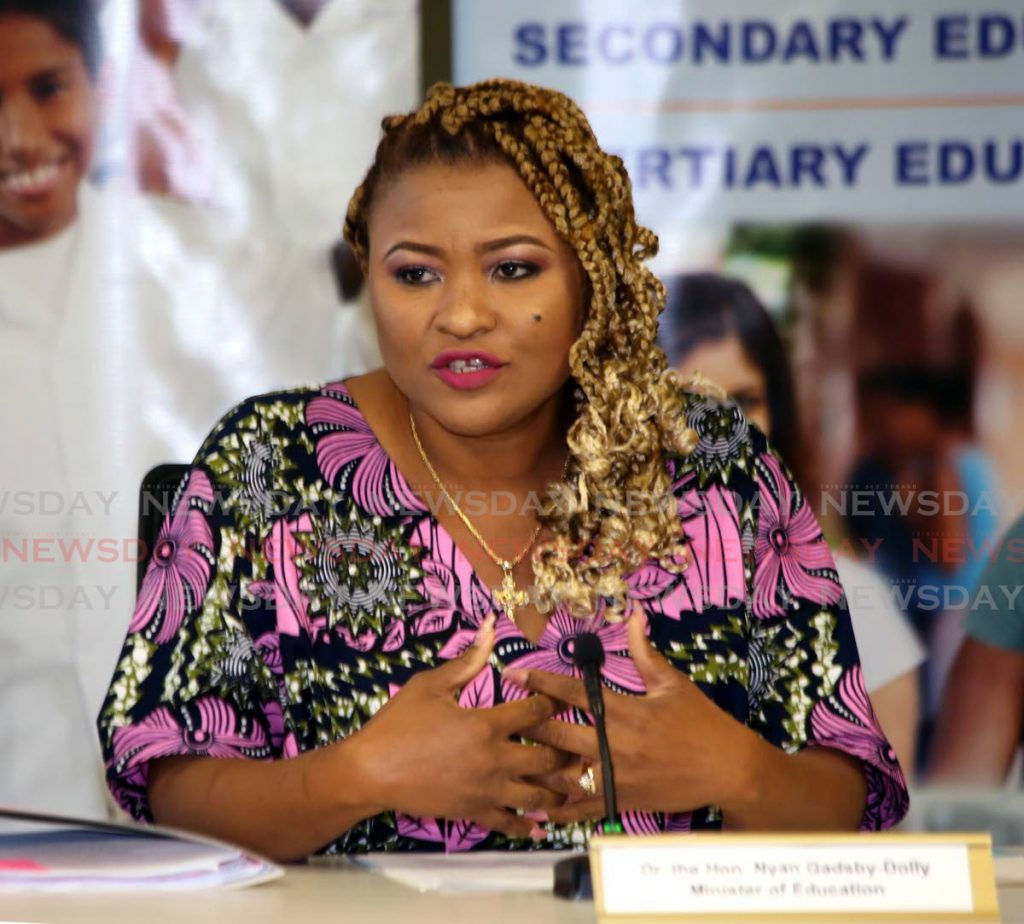Education Minister: Adjusting CSEC, CAPE would be hard

EDUCATION Minister Dr Nyan Gadsby-Dolly has said the recommendations made by the United Nations Children's Emergency Fund (UNICEF) to make adjustments for students sitting CSEC and CAPE exams would be difficult to adopt.
Gadsby-Dolly said the Caribbean Examinations Council CXC has said to adopt the recommendations made by the Caribbean Union of Teachers and supported by UNICEF would incur significant costs and push the exams back to a July 26 start.
In a text message on Wednesday the minister said, “This is viewed by most countries as difficult due to the domino effect it would have on the release of results and students' matriculation into universities, Form Six etc.”
She said the CXC Council met on Tuesday to make final recommendations, which should be communicated to the various countries today, Wednesday.
Earlier this week, UNICEF expressed concern over CXC's decision to maintain the current design of the Caribbean Secondary Education Certificate (CSEC) and Caribbean Advanced Proficiency Examination (CAPE).
UNICEF called for CXC and ministers of education in the region to make adjustments to the content and administration of these exams in keeping with the CUT recommendations to ensure the region's students are not further disadvantaged.
The UN agency acknowledged the efforts already made by CXC but said there are still issues requiring more substantial changes and flexibility.
It pointed out that no change has been made on the multiple-choice paper (Paper 1) which will still cover the entire syllabus, and no clear structure was shared as to how those students who meet deferral requirements and choose to defer will be supported to sit the exams at a later date in 2022.
UNICEF argued that the pandemic has further exacerbated the gaps in preparedness among the most disadvantaged students and there is a higher risk of students in vulnerable conditions not sitting the exams this year. It pointed out that this could seriously affect the further education of these students.
UNICEF suggested that education ministers should ask CXC to further simplify the content and methodology of the exams across all subjects and adapt the timeline to challenges students are facing to ensure equitable accessibility and participation.
Among the recommendations by CUT are: Paper 1 should only test rationalised topics that are tested in Paper 2 and not the entire syllabuses, as the syllabuses would not have been completed.
For Paper 2, remove all hurdles including compulsory questions and ensure that no one question item should test two or more content areas.
Postpone the start of the exams by three weeks and release the rationalised board topics immediately to students and teachers to allow effective preparation.
It has also requested the education ministers to expand and intensify the provision of mental health and psychosocial support for children as they prepare for the exams; offset any financial costs for deferral to 2022; and ensure placement for them; as well as clarifying how covid19 cases will be taken into consideration, given the variation among the countries.
President of the Trinidad and Tobago Unified Teachers Association (TTUTA) Antonia De Freitas said its general council met and has agreed that the exams should not be held in the current format, on the basis of health and safety issues.


Comments
"Education Minister: Adjusting CSEC, CAPE would be hard"